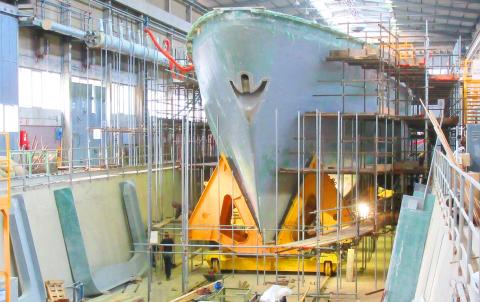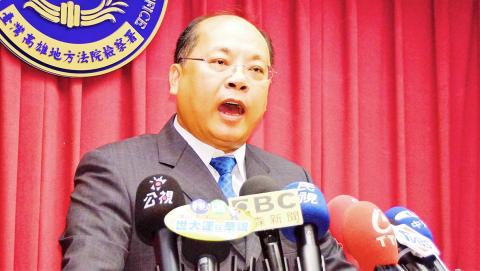Authorities in Kaohsiung yesterday questioned executives of Ching Fu Shipbuilding Co (慶富造船), which is suspected of defrauding banks and using money intended for a Republic of China Navy contract to invest in projects in China.
The Kaohsiung District Prosecutors’ Office questioned 19 people from the company, which was contracted by the navy to build six minesweepers.
Company executives are suspected of securing NT$35.293 billion (US$1.164 billion) in loans under false pretences.

Photo courtesy of Ching Fu Shipbuilding Co
Ching Fu owner and president Chen Ching-nan (陳慶男) and his son, company vice chairman Chen Wei-chih (陳偉志), were later released after posting bail of NT$8 million and NT$5 million respectively.
More than 100 law enforcement personnel, headed by Kaohsiung prosecutors and the Ministry of Justice’s Investigation Bureau, on Wednesday searched 14 locations linked to the probe into the firm and its parent company, Ching Fu Group (慶富集團).
Company executives and managers involved in procurement and financial operations were questioned by prosecutors and were listed as people of interest in the case.

Photo: CNA
Ching Fu Shipbuilding, one of Taiwan’s largest private shipbuilders, in October 2014 won a Ministry of National Defense contract to build six minesweepers as part of the nation’s indigenous ship building and upgrade program.
After securing the contract, Ching Fu Shipbuilding allegedly colluded with a South Korean firm in 2015 and last year to set up three overseas shell companies to launder money, prosecutors said.
Chen Ching-nan and Chen Wei-chih used fraudulent receipts and forged documents from the shell companies to obtain loans from 12 Taiwanese banks, prosecutors said.
The largest was a NT$20.5 billion joint loan from a consortium of nine banks headed by First Commercial Bank (第一銀行).
The first of the vessels to be built according to the contract was a 700 tonne ship, which is being constructed by Italy’s Intermarine SpA, with US firm Lockheed Martin providing support for the mine detection hardware and weapon systems.
Ching Fu Shipbuilding was to build the remaining vessels.
Prosecutors said that Chen Ching-nan and Chen Wei-chih had admitted using false documents to obtain bank loans.
However, they said the firm faced financial difficulties because the ministry had not paid initial installments outlined in the contract.
They said that the situation meant the company was unable to gain US approval to import weapons systems, according to prosecutors.
Allegations of fraud and illegal transfers of funds were raised when investigators found that Ching Fu Group had boosted its listed capital to NT$5 billion, partly from bank loans, and was in talks over a series of joint ventures with Chinese companies.
Investigators said Chen Wei-chih was in Shanghai in June to meet with China MCC20 Group’s (二十冶集團) Zhang Jinxian (張進賢) regarding a joint venture to build luxury resorts and an amusement park on Dongshan Island in China’s Fujian Province.
Meanwhile, the Financial Supervisory Commission yesterday said that despite loan irregularities involving false documents, Ching Fu Shipbuilding had not lapsed in servicing its debt and no domestic banks have filed a complaint about the company.
The commission confirmed that First Commercial Bank had arranged the syndicated loan, of which the shipbuilder had received about NT$15 billion, but declined to provide further details amid an ongoing investigation.
Regarding the allegedly false documents used to secure the loan, the commission said that the banks involved could face penalties for shortcomings in their loan approval procedures and internal controls.
Additional reporting by Ted Chen

AGING: As of last month, people aged 65 or older accounted for 20.06 percent of the total population and the number of couples who got married fell by 18,685 from 2024 Taiwan has surpassed South Korea as the country least willing to have children, with an annual crude birthrate of 4.62 per 1,000 people, Ministry of the Interior data showed yesterday. The nation was previously ranked the second-lowest country in terms of total fertility rate, or the average number of children a woman has in her lifetime. However, South Korea’s fertility rate began to recover from 2023, with total fertility rate rising from 0.72 and estimated to reach 0.82 to 0.85 by last year, and the crude birthrate projected at 6.7 per 1,000 people. Japan’s crude birthrate was projected to fall below six,

US President Donald Trump in an interview with the New York Times published on Thursday said that “it’s up to” Chinese President Xi Jinping (習近平) what China does on Taiwan, but that he would be “very unhappy” with a change in the “status quo.” “He [Xi] considers it to be a part of China, and that’s up to him what he’s going to be doing, but I’ve expressed to him that I would be very unhappy if he did that, and I don’t think he’ll do that. I hope he doesn’t do that,” Trump said. Trump made the comments in the context

SELF-DEFENSE: Tokyo has accelerated its spending goal and its defense minister said the nation needs to discuss whether it should develop nuclear-powered submarines China is ramping up objections to what it sees as Japan’s desire to acquire nuclear weapons, despite Tokyo’s longstanding renunciation of such arms, deepening another fissure in the two neighbors’ increasingly tense ties. In what appears to be a concerted effort, China’s foreign and defense ministries issued statements on Thursday condemning alleged remilitarism efforts by Tokyo. The remarks came as two of the country’s top think tanks jointly issued a 29-page report framing actions by “right-wing forces” in Japan as posing a “serious threat” to world peace. While that report did not define “right-wing forces,” the Chinese Ministry of Foreign Affairs was

PREPAREDNESS: Given the difficulty of importing ammunition during wartime, the Ministry of National Defense said it would prioritize ‘coproduction’ partnerships A newly formed unit of the Marine Corps tasked with land-based security operations has recently replaced its aging, domestically produced rifles with more advanced, US-made M4A1 rifles, a source said yesterday. The unnamed source familiar with the matter said the First Security Battalion of the Marine Corps’ Air Defense and Base Guard Group has replaced its older T65K2 rifles, which have been in service since the late 1980s, with the newly received M4A1s. The source did not say exactly when the upgrade took place or how many M4A1s were issued to the battalion. The confirmation came after Chinese-language media reported